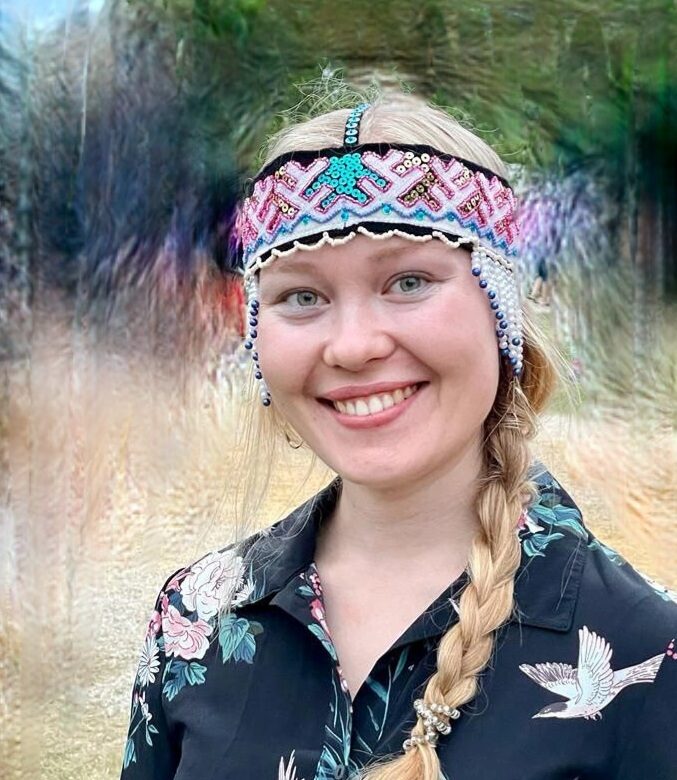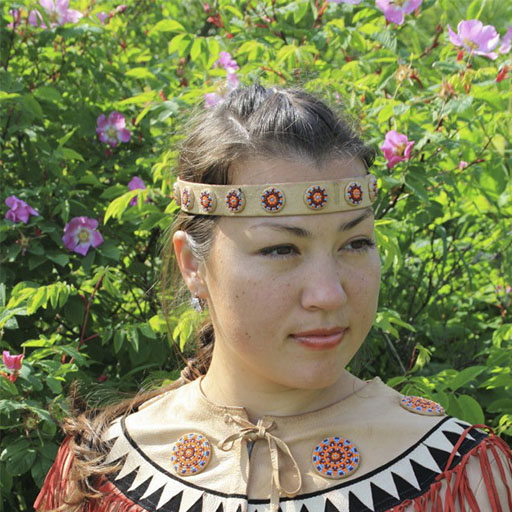Welcome to
AIVAN
art network

Who We Are
AIVAN in Itelmen language means North. It is an informal platform that unites Indigenous artists throughout the Arctic and beyond to share Indigenous wisdom through creative arts. We meet virtually to exchange knowledge, traditional crafts techniques, and facilitate discussions on the place of Indigenous arts in the 21st century.
Our Goals
- Advance our understanding of the value and meaning of artistic expressions to the well-being and wellness of Indigenous communities and share best practices;
- Exchange our visions on sustainability;
- Provide a platform for knowledge sharing and mutual learning and support
Our Objectives
- Share perspectives on human-nature relations through learning about history, beliefs, values, subsistence woven into Indigenous art forms;
- Exchange knowledge about sustainable use of natural materials in daily art practices;
- Develop collaborative art-science projects;
- Offer workshops on different aspects of Indigenous art forms;
Facilitate discussions on the current trends in the sphere of the development of Indigenous arts; - Foster Indigenous storytelling and knowledge sharing.
Tatiana Degai
Department of Anthropology, University of Victoria, British Columbia, Canada
I am Itelmen from Kamchatka, Russia. My scholarly and creative work is led by Indigenous epistemologies and ways of being and is informed by the beautiful land of Kamchatka, the waters of the Pacific Ocean, the shores of the Sea of Okhotsk, and salmon.
Through applying Indigenous storywork (Archibaldt 2008) approach I center Indigenous knowledge in research to strengthen the well-being of my own Itelmen community and to advocate for broader recognition of Indigenous sciences in the academy. This includes initiatives on language revitalization, development of community-friendly educational materials, diverse projects on reclaiming cultural heritage of Itelmens, and art-science projects. In my work I rely on collaboration with the Elders, youth and wider Itelmen and Indigenous community for co-creation of knowledge and co-understanding of the ways to move forward in addressing the current socio-environmental challenges.
In this route I follow the steps and guidance of my grandmother and my mother – Itelmen matriarchs who have been my primary teachers, advisors, and co-researchers. It is because of their wise leadership I am now in the rich world of Arctic Indigenous arts and science.
I am currently an assistant professor at the Department of Anthropology at the University of Vitoria
Reference:
Archibald, J. A. (2008). Indigenous storywork: Educating the heart, mind, body, and spirit. UBC press.

- Andrey.petrov@uni.edu
ANDREY PETROV
ARCTICenter, University of Northern Iowa (Cedar Falls, IA, United States)
My name is Andrey Nikolaevich Petrov and I work and live in Iowa, USA on the ancestral lands and territories of the Ioway Nation currently stewarded by the Meskwaki People. Here I direct the ARCTICenter and I hold a professorship in Geography at the University of Northern Iowa. I am the son of Nikolay Ivanovich Petrov and Elena Leonidovna Rogaleva. I was born and raised in St. Petersburg, Russia, a former Russian capital city located on the historical lands of the Ižora People. My ancestors have lived on these lands for many generations arriving from the south, and my other forebears came from the Tver’ and Yaroslavl’ regions of Russia as well as from Finland and Latvia. Two decades ago I moved to what is now known as Cedar Falls, Iowa by way of Toronto, Canada.
In the last 15 years I worked with and have been guided by the Indigenous Peoples conducting research in Arctic Russia, Alaska and Canada, as well as around the Circumpolar Region, across the Arctic Indigenous homelands. I have been closely involved in the work of the Arctic Council and in collaboration with the Arctic Indigenous Peoples organizations – Permanent Participants in particular. I have also been involved in other international roles through the International Science Committee (IASC) and International Arctic Social Sciences Association (IASSA).

- psyadeyskaya@uvic.ca
Polina Syadeyskaya
Project Research Assistant, University of Victoria, British Columbia, Canada
My name is Polina Syadeyskaya (syadey means spirit pole in Nenets). I am Nenets and Russian. My extended family raised me in the Krasnoe village, Nenets Autonomous Okrug. My grandfather was born and raised in a family of Nenets nomadic reindeer herders in the Bolshezemelskaya tundra. I have been subsistence fishing and gathering wild berries and mushrooms with my family since early childhood. I have a strong connection to my homeland tundra. I have been learning Nenets, it is such a joy for my soul!

